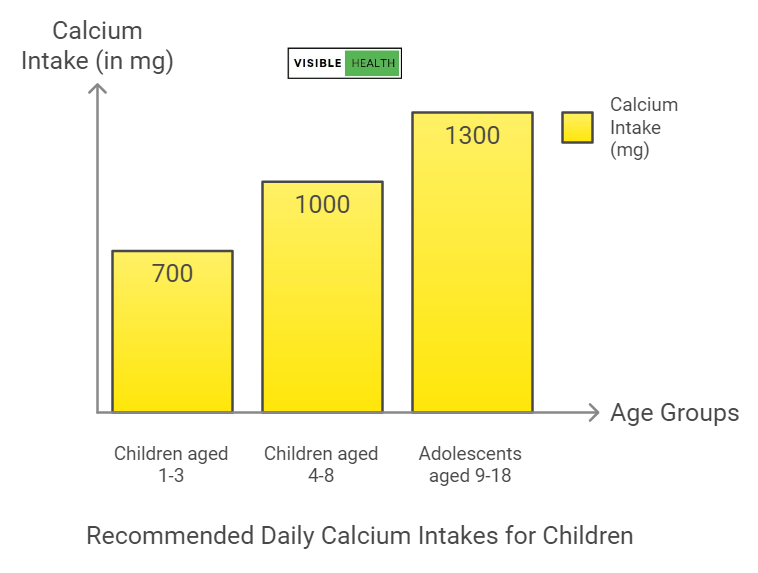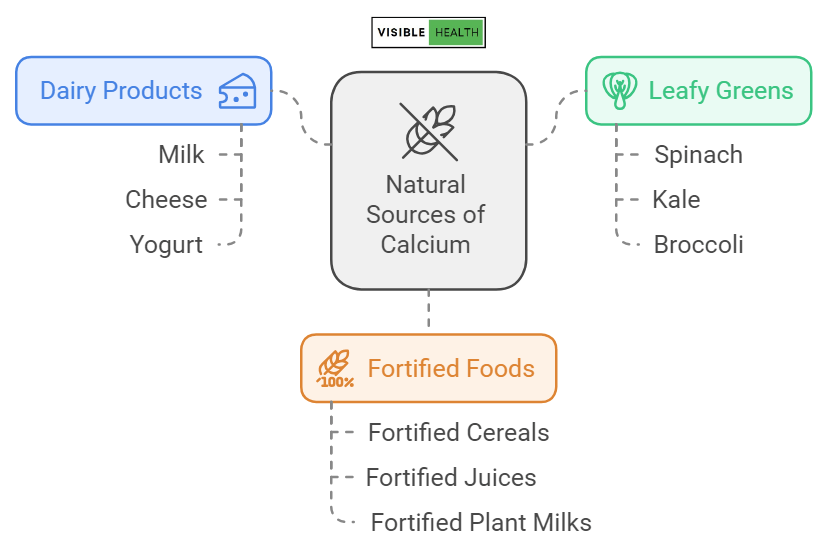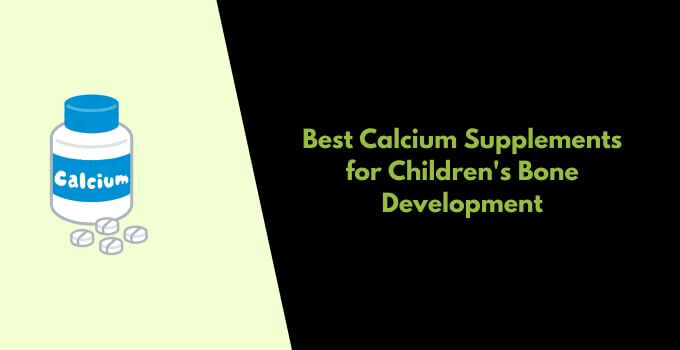Children with the right amount of calcium in their diet are more likely to develop strong, healthy bones that support their growth and overall well-being. Calcium is a vital nutrient, not only for bone formation but also for muscle function and nerve signaling. Unfortunately, many children fall short of meeting their daily calcium needs, which can affect their bone density and long-term health. To ensure your child gets the proper amount of calcium, especially if dietary sources are lacking, calcium supplements can provide the necessary support. In this guide, we’ll explore the best calcium supplements for children’s bone development, highlighting their benefits, safety, and effectiveness at different growth stages.
What Is Calcium?
Calcium is a vital mineral, symbolized as Ca with an atomic number of 20, that plays a crucial role in biological systems. As one of the alkaline earth metals, it is the most abundant metallic element in the human body, essential for various physiological functions, including muscle contraction, nerve transmission, and blood coagulation. Approximately 99% of the body’s calcium is stored in bones and teeth, providing structural integrity and strength. Scientific evidence underscores its importance; calcium ions (Ca²⁺) are involved in signaling pathways that regulate cellular processes and maintain homeostasis. Furthermore, adequate calcium intake during childhood is critical for optimal bone development, reducing the risk of osteoporosis and fractures later in life.
Why Is Calcium Important for Children Bone Density and Overall Health?
Calcium is essential for building strong bones in children and plays a pivotal role in their overall health. You need to guarantee your child consumes adequate calcium during childhood and adolescence to achieve peak bone mass, reducing the risk of fractures and osteoporosis later in life.
The bones store 98% of the body’s calcium, which is primarily accrued during childhood and early adolescence. Adequate calcium intake is particularly vital during puberty (around 9 to 14 years of age), when bone growth peaks and bone mass approximately doubles.
What Are the Recommended Daily Calcium Intakes for Children?
To guarantee your child develops strong bones, it’s essential to understand the recommended daily calcium intakes based on age.
Children aged 1-3 need 700 mg of calcium daily, spread over 2-3 servings of calcium-rich foods.
For children aged 4-8, the recommended daily intake increases to 1,000 mg, also achievable through 2-3 servings, while adolescents aged 9-18 require 1,300 mg, typically from 4 servings of calcium-rich foods daily.

How Much Calcium Do Children Aged 1-3 Need?
For children aged 1-3, adequate calcium intake is essential for supporting their growing bones. According to health guidelines, children in this age group need 700 mg of calcium per day. This amount can be achieved through 2-3 servings of calcium-rich foods.
Key sources of calcium include dairy products like milk, yogurt, and cheese, as well as fortified soy milk and dark green leafy vegetables like broccoli and kale.
Meeting this daily calcium requirement helps prevent conditions such as rickets and lays the foundation for strong bone health throughout life. Parents can guarantee their child gets enough calcium by incorporating a variety of these foods into their diet.
For those with lactose intolerance or dietary restrictions, discussing alternative sources with a healthcare provider is recommended.
How Much Calcium Do Children Aged 4-8 Need?
Children grow rapidly between the ages of 4 and 8, and their bones need increasing amounts of calcium to support this growth. The recommended daily calcium intake for children aged 4 to 8 is 1,000 mg (milligrams).
To achieve this, you should guarantee your child consumes a well-rounded diet that includes:
- Dairy products such as milk, yogurt, and hard cheeses like cheddar
- Calcium-fortified foods such as soy milk and juice
- Dark green leafy vegetables like broccoli and kale
- Foods rich in calcium like almonds and sesame seeds
Meeting this daily calcium requirement is essential for developing peak bone mass, which can reduce the risk of fractures and osteoporosis later in life.
A balanced diet and adequate physical activity are vital for overall bone health during these critical developmental years.
How Much Calcium Do Adolescents Aged 9-18 Need?
Adolescents aged 9-18 are in a high-growth phase when their bones require substantial amounts of calcium to reach peak bone mass. To support this growth, they need a higher calcium intake compared to younger children.
The recommended daily calcium intake for adolescents aged 9-18 is 1,300 mg. This amount helps guarantee the development of strong, dense bones that are less susceptible to fractures and osteoporosis later in life.
Key sources of calcium include dairy products like milk, yogurt, and cheese, as well as fortified soy milk, leafy green vegetables such as broccoli and kale, and fortified cereals and juices.
Vitamin D is also essential for the body to absorb calcium effectively, making it important to include vitamin D-rich foods or supplements in their diet.
Regular physical activity further enhances bone health.
What Signs Indicate That a Child May Need a Supplement?
Several key indicators suggest that a child may require a calcium supplement. If your child is lactose intolerant, follows a vegan or vegetarian diet, or is a picky eater avoiding dairy products, they may not be getting enough calcium from their diet.
Additionally, if your child’s diet primarily consists of soda, juice, and sports beverages instead of milk, they may need a supplement. Moreover, inactive children who don’t spend time outside for sun exposure, which is essential for vitamin D synthesis, may also benefit from a supplement.
Discussing these factors with your healthcare provider can help determine if a calcium supplement is necessary. Your provider can assess your child’s specific needs and recommend appropriate supplements if dietary modifications aren’t sufficient.
Children who are female athletes in sports emphasizing lean physique may also be at risk due to the high demand for calcium and vitamin D for strong bones.
Consult your healthcare provider about the potential need for supplements in these cases. Regular monitoring and discussions with your child’s healthcare provider can guarantee they get the calcium needed for healthy bone development.
What Are the Best Calcium Supplement for Children?
When selecting a calcium supplement for your child, it’s essential to evaluate products known for their effectiveness and safety.
Some top-rated options include Cal-Mag Fizz Calcium & Magnesium Drink Mix, which provides a thorough blend of calcium and magnesium, and ChildLife Liquid Calcium with Magnesium For Children, which offers a liquid formula that can be easier for children to take.
Other notable choices include L’il Critters Calcium + Vitamin D3, Bone Support, U-Cubes Children’s Calcium with D3 Chewable Gummy, and Yummy Bears Calcium Supplement, each offering a variety of forms to suit different child preferences.
1. Cal-Mag Fizz Calcium & Magnesium Drink Mix
Cal-Mag Fizz is a dietary supplement combining calcium and magnesium in a fizzy drink mix for easy consumption, supporting strong bones and teeth, muscle function, and overall mineral balance.

Its powdered formula dissolves in water, creating a revitalizing beverage that enhances absorption and user compliance. Each serving contains calcium from calcium carbonate and magnesium from magnesium citrate, along with natural flavors and sweeteners like stevia.
Listed below are the key benefits of cal-mag supplement.
- Supports bone health and muscle function.
- Easy to consume in a fizzy drink format.
- One bottle typically contains 30 servings for a full month’s supply.
- Approximate price per bottle is $25.95-$30.83, with a money-back guarantee.
2. ChildLife Liquid Calcium with Magnesium For Children
ChildLife Liquid Calcium with Magnesium stands out as the best calcium supplement for children. This dietary supplement is specifically designed to support healthy bone growth and development in children.

It combines essential nutrients like calcium, magnesium, and vitamin D3 in a balanced ratio to enhance absorption and overall bone health.
Key benefits include promoting healthy bone growth, supporting dental health, and aiding in muscle function. The recommended dosage is 1 tablespoon (15 ml) per day, taken with meals.
Each 16 oz bottle provides approximately 32 servings, sufficient for one month. Remarkably, ChildLife offers a satisfaction guarantee, allowing customers to return the product if not satisfied.
With its natural orange flavor and absence of artificial additives, ChildLife Liquid Calcium with Magnesium is a reliable choice for children’s nutritional needs.
3. L’il Critters Calcium + Vitamin D3, Bone Support
L’il Critters Calcium Gummy Bears are dietary supplements designed for children to support bone health and development.

The gummy bears are made using a pectin-based formula, which is a plant-derived ingredient that helps create a chewy texture. They are formulated to be both tasty and nutritious, making them appealing to children.
Key features include natural ingredients such as calcium citrate and cholecalciferol, devoid of artificial preservatives.
These gummy bears provide essential calcium and vitamin D, which are crucial for developing strong bones and teeth in children. They help prevent deficiencies that can lead to health issues related to bone growth.
For ideal use, children aged 2 and older can take 2 gummy bears daily, preferably with a meal.
Each bottle contains 60 gummy bears, providing a 30-day supply, and is priced approximately at $9.99 with a 30-day money-back guarantee if unsatisfied.
4. U-Cubes Children’s Calcium with D3 Chewable Gummy
Solgar’s U-Cubes Children’s Calcium + D3 Gummies are designed to provide essential nutrients for robust bone development and healthy growth in children. By choosing Solgar’s U-Cubes, you are opting for a product that is not only effective but also adheres to strict quality and safety standards.

These chewable gummies are designed to support children’s bone health and overall growth, providing calcium (as Calcium Citrate) and Vitamin D3 (Cholecalciferol) in a tasty form without artificial preservatives or sweeteners.
The combination of calcium and Vitamin D3 supports the development of strong bones and teeth, promotes healthy growth, and aids in calcium absorption.
Children aged 2-3 years can take 2 gummies daily, while those 4 years and older can take 4 gummies daily, preferably with a meal.
One bottle (120 gummies) is approximately $12.99 and lasts about 20-40 days depending on age.
Solgar offers a satisfaction guarantee, ensuring a refund if you’re not satisfied.
5. Yummy Bears Calcium Supplement
Yummi Bears Vegetarian Calcium is another highly regarded option for parents seeking a reliable calcium supplement for their children.

Formulated with calcium citrate, vitamin D3, natural flavors, organic cane sugar, and pectin, these gummies are both appealing and nutritious. Made using a vegetarian-friendly process, they guarantee that no animal-derived ingredients are included.
By providing essential calcium and vitamin D3, Yummi Bears support healthy bone development in children. The recommended dosage is 2 gummies daily for children aged 2 and older, preferably taken with a meal.
One bottle contains 60 gummies, a one-month supply, and is priced around $12.99. With a satisfaction guarantee, parents can feel confident in their choice of Yummi Bears for their child’s bone health needs.
How is Vitamin D Important to Calcium Absorption?
When it comes to maximizing the effectiveness of calcium supplements in children’s bone development, it’s essential to take into account the role of other important nutrients.
Calcium works in tandem with vitamin D to guarantee ideal absorption and bone growth. Vitamin D plays a significant role in the body’s ability to absorb calcium, which then gets deposited into bones, making them stronger.
Without sufficient vitamin D, calcium supplements may not be as effective. Other nutrients like magnesium also support bone health, further emphasizing the importance of a well-rounded dietary approach.
Confirming adequate intake of these additional nutrients is key to maximizing the benefits of calcium supplements and promoting healthy bone development in children.
Proper dietary balance, including foods rich in calcium and vitamin D, supports ideal bone health.
What Are the Natural Sources of Calcium?
When looking for natural sources of calcium for your child’s bone development, you can turn to a variety of healthy options.
Dairy products, such as milk, yogurt, and cheese, are among the richest sources of calcium, offering essential nutrients in a form that’s easy for children to digest.
Additionally, leafy greens like broccoli, kale, and spinach, as well as fortified foods like soy milk and calcium-enriched juices, provide excellent alternative sources of calcium to support your child’s growing bones.

Dairy Products
For children, incorporating dairy into their diet can be as simple as ensuring they consume low-fat milk, yogurt, and cheese.
These dairy products are high in calcium: a cup of milk offers about 245-265 mg, a cup of yogurt provides approximately 260 mg, and an ounce of cheese contains around 200 mg.
Dairy products are recommended for children because they help in calcium absorption due to their lactose and casein phosphorylated peptides, making them an efficient way to meet daily calcium needs.
Regular intake supports strong bone formation during the critical growth periods.
Leafy Greens
Beyond dairy products, there’s a variety of other natural sources of calcium that can enrich your child’s diet. Leafy greens are a significant contributor to meeting daily calcium needs. These include broccoli, kale, collard greens, Chinese cabbage, bok choy, and turnip greens.
For example, broccoli offers about 33 mg of calcium per half cup when cooked, while Chinese cabbage can provide up to 84 mg per half cup. Other leafy options like kale and turnip greens contain about 49 mg and 104 mg of calcium per half cup, respectively.
Incorporating these vegetables into meals can help guarantee your child gets enough calcium for robust bone development. Regular consumption of these greens, along with other calcium-rich foods, can support the body’s absorption of calcium for healthy bone growth.
Fortified Foods
Fortified foods offer another way to boost your child’s calcium intake, especially if they’re not big fans of dairy or leafy greens.
These foods have calcium added to them during processing. Key examples include calcium-fortified cereals, which can provide up to 1,000 mg per serving, and fortified plant-based milks like soy milk and almond milk.
Additionally, some types of orange juice and breads are also fortified with calcium, enhancing their nutritional value. For instance, one cup of fortified soy milk can deliver 23% of the daily recommended value, while a cup of calcium-fortified orange juice can offer 27%.
What Dangers Are Associated with Excessive Calcium Intake?
When considering calcium supplements for children’s bone development, it’s vital to be aware of the potential dangers associated with excessive calcium intake.
Taking too much calcium can lead to side effects like gas, bloating, constipation, and indigestion, and may even increase the risk of heart problems and kidney stones.
It’s essential to consult with a healthcare provider to determine the appropriate amount of calcium for your child’s age and needs, ensuring they stay within recommended daily limits and primarily obtain calcium through a balanced diet.
Are There Any Side Effects of Giving Calcium Supplements to Children?
Excessive calcium intake in children can lead to unwanted side effects. These include constipation, fatigue, irregular heart rhythms, kidney stones, and nausea.
It’s essential to stay within the recommended daily intake limits for each age group to avoid these complications. For example, children aged 0-6 months shouldn’t exceed 1000 mg, while those aged 9-18 years shouldn’t go over 3000 mg.
It’s also important to take into account vitamin D intake, as it helps with calcium absorption. Breaking up calcium intake throughout the day and choosing easily absorbed forms like calcium citrate can help minimize risks.
Affiliate Disclosure: Some of the links in this post are affiliate links, which means I may earn a small commission if you make a purchase through those links. This comes at no extra cost to you. Thank you for your support!

